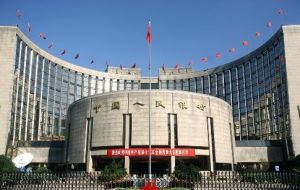MercoPress. South Atlantic News Agency
China surprise move to control liquidity sends markets plunging
 Commodities also reflected concern about China’s central bank decision
Commodities also reflected concern about China’s central bank decision China's central bank surprised markets on Thursday by raising the interest rate on its three-month bills for the first time since August, intensifying its grip on liquidity a day after it promised to keep credit growth in check.
While analysts said the move was just a withdrawal of surplus cash in the system, markets feared the worst, taking it as a sign the central bank could be getting ready to use more forceful measures to cool growth and fight inflation, such as raising benchmark lending rates.
The prospect of a tougher policy stance from Beijing sent Chinese shares tumbling and hit a range of commodities, as investors feared that putting the brakes on growth could weaken the appetite of the world's third-largest economy for steel, copper and other resources needed to fuel it.
But analysts said the move should be seen more as an effort by the People's Bank of China (PBOC) to even out the flow of liquidity into the system, in particular to press banks not to repeat the start-of-the-year rush to lend that marked 2009.
The PBOC on Thursday sold three-month bills at a yield of 1.3684%, up 4.04 basis points from 1.3280% last week, the level it has kept over the past four months.
China's key stock index CSI fell 1.9% as the move sparked worries about a possible imminent interest rate hike. Meanwhile, the Yuan hit a one-month high against the US dollar on expectations of higher rates.
Commodities bore the brunt of the investor exodus, with oil slipping below 83 USD a barrel on concerns about demand from China and Shanghai copper futures losing all of a near 5% gain to snap a 10-day winning streak.
However dealers also pointed out to the fact that China typically uses open market operations, including auction yields of its bills, to signal the momentum of quantitative tightening and only hikes of official interest rates will really signal a monetary policy tightening.
The PBOC is set to absorb up a net 137 billion Yuan from the money market via bills and bond repurchase agreements this week, its biggest weekly drain in about four months. Over the past eight months, PBOC reserves have risen by around 1.6 trillion Yuan (234 billion USD) while its liabilities (bills, bonds, repurchase agreements and reserve requirements) were roughly unchanged.
Traders said PBOC move appeared to be aimed at banks as a warning that it would not tolerate excessive lending in the early months of 2010 like the banks did in the same period of 2009. Concerns about rising inflation and asset bubbles in the key property sector were also among reasons for the move.
On Wednesday, China's central bank said that it would pay particularly close attention to the property market in 2010 while managing inflationary expectations.




Top Comments
Disclaimer & comment rulesCommenting for this story is now closed.
If you have a Facebook account, become a fan and comment on our Facebook Page!